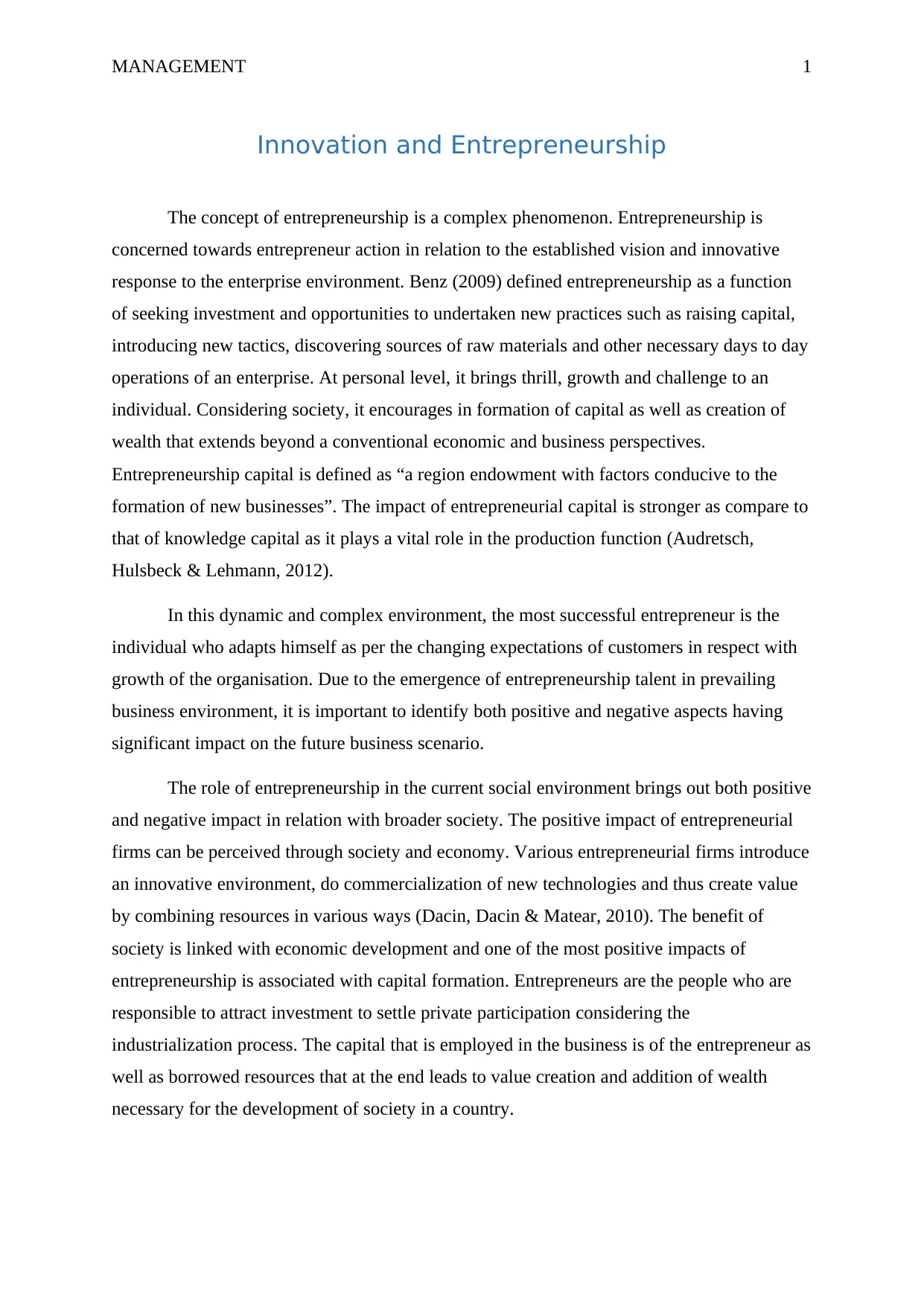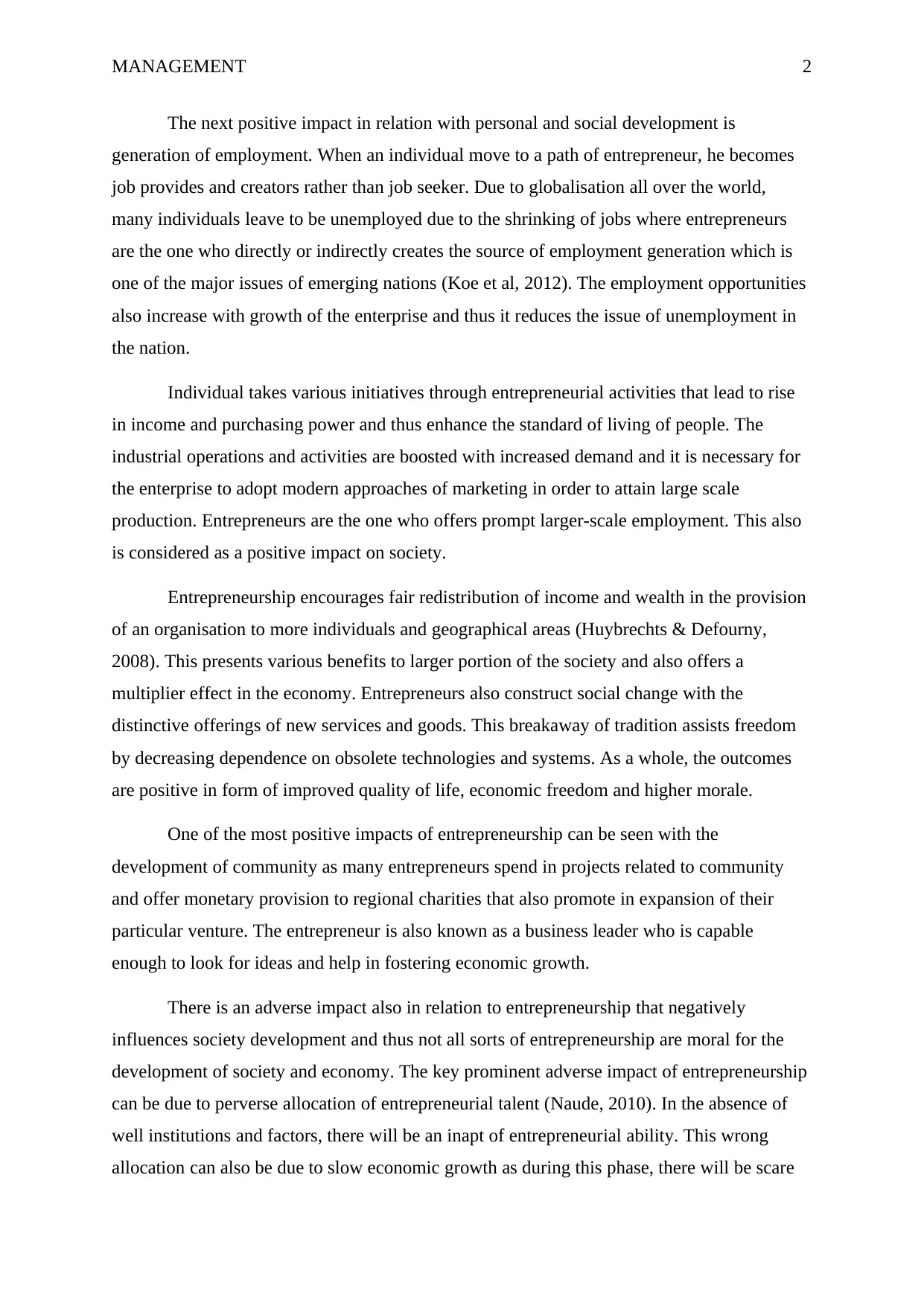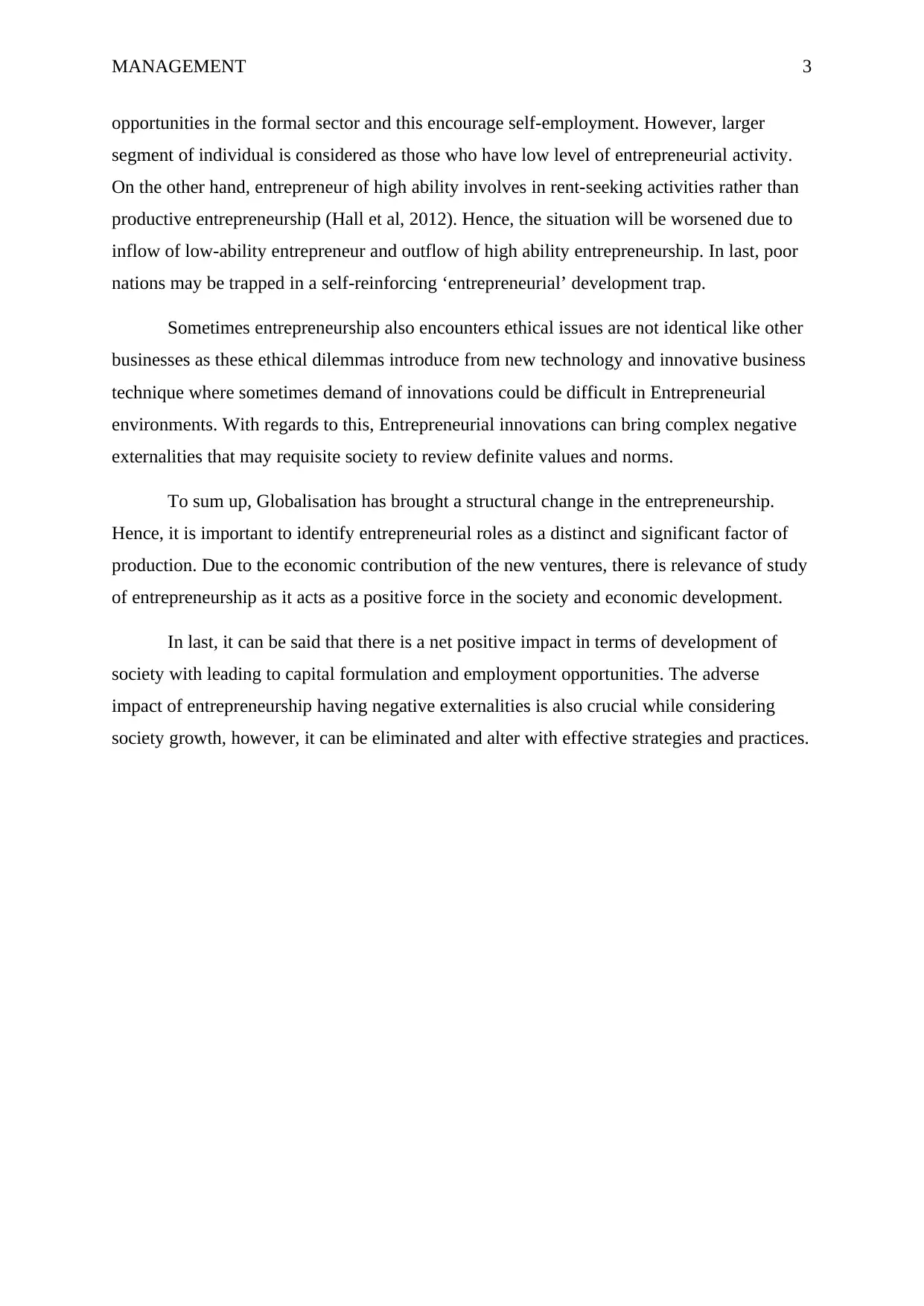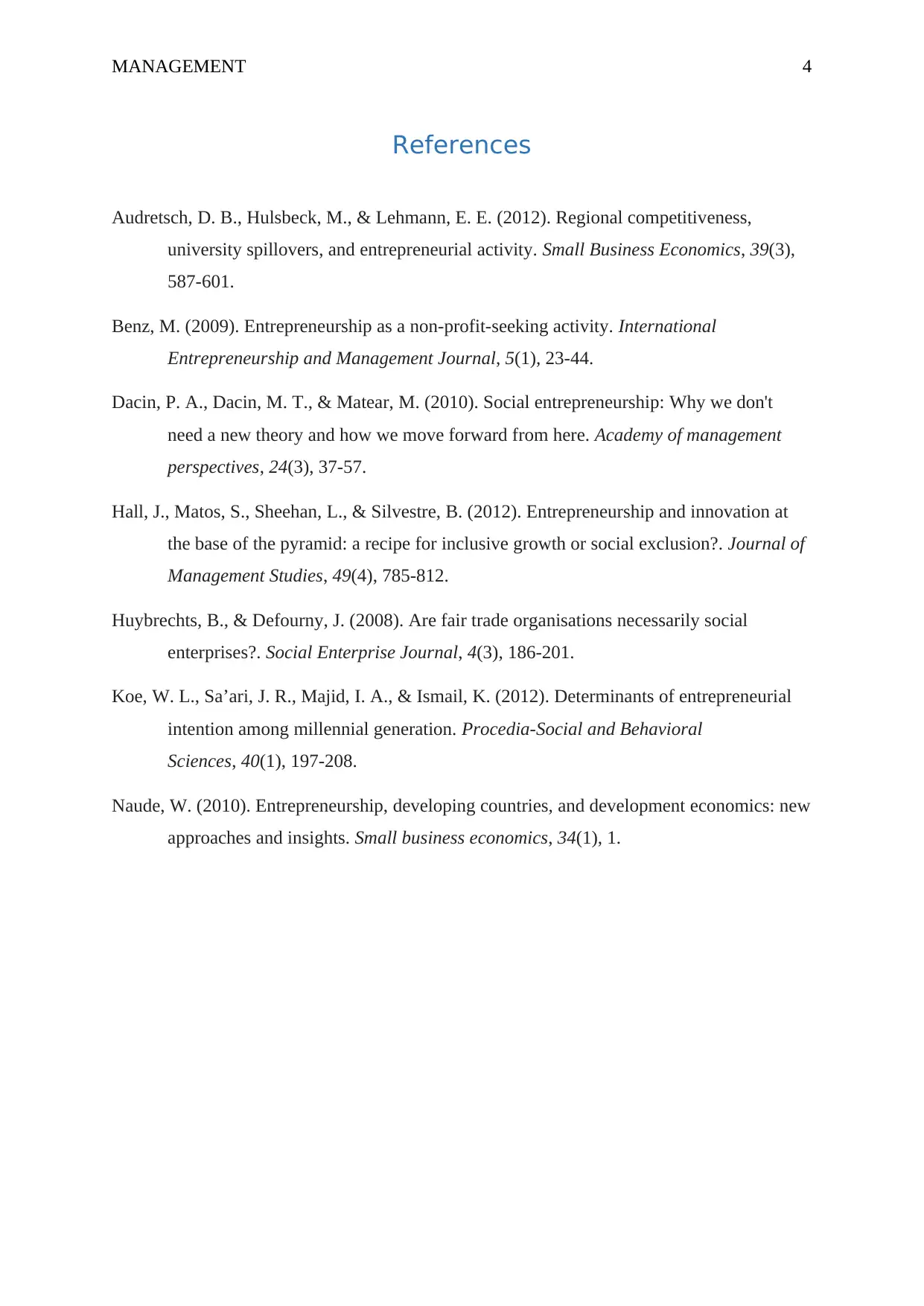Management Innovation, Entrepreneurship, and Societal Impact
VerifiedAdded on 2023/04/08
|5
|1186
|94
Essay
AI Summary
This essay delves into the complex relationship between management innovation and entrepreneurship, examining both the positive and negative impacts on society and the economy. It highlights the role of entrepreneurship in capital formation, job creation, and societal development, while also addressing potential adverse effects such as the misallocation of entrepreneurial talent and ethical dilemmas arising from new technologies. The essay emphasizes the importance of identifying entrepreneurial roles in a globalized world and suggests that the net impact of entrepreneurship is positive, leading to societal development through capital formulation and employment opportunities, with the potential to mitigate negative externalities through effective strategies and practices. Desklib provides a platform for students to access this and other solved assignments for academic support.

Running Head: MANAGEMENT 0
INNOVATION AND
ENTREPRENEURSHIP
INNOVATION AND
ENTREPRENEURSHIP
Paraphrase This Document
Need a fresh take? Get an instant paraphrase of this document with our AI Paraphraser

MANAGEMENT 1
Innovation and Entrepreneurship
The concept of entrepreneurship is a complex phenomenon. Entrepreneurship is
concerned towards entrepreneur action in relation to the established vision and innovative
response to the enterprise environment. Benz (2009) defined entrepreneurship as a function
of seeking investment and opportunities to undertaken new practices such as raising capital,
introducing new tactics, discovering sources of raw materials and other necessary days to day
operations of an enterprise. At personal level, it brings thrill, growth and challenge to an
individual. Considering society, it encourages in formation of capital as well as creation of
wealth that extends beyond a conventional economic and business perspectives.
Entrepreneurship capital is defined as “a region endowment with factors conducive to the
formation of new businesses”. The impact of entrepreneurial capital is stronger as compare to
that of knowledge capital as it plays a vital role in the production function (Audretsch,
Hulsbeck & Lehmann, 2012).
In this dynamic and complex environment, the most successful entrepreneur is the
individual who adapts himself as per the changing expectations of customers in respect with
growth of the organisation. Due to the emergence of entrepreneurship talent in prevailing
business environment, it is important to identify both positive and negative aspects having
significant impact on the future business scenario.
The role of entrepreneurship in the current social environment brings out both positive
and negative impact in relation with broader society. The positive impact of entrepreneurial
firms can be perceived through society and economy. Various entrepreneurial firms introduce
an innovative environment, do commercialization of new technologies and thus create value
by combining resources in various ways (Dacin, Dacin & Matear, 2010). The benefit of
society is linked with economic development and one of the most positive impacts of
entrepreneurship is associated with capital formation. Entrepreneurs are the people who are
responsible to attract investment to settle private participation considering the
industrialization process. The capital that is employed in the business is of the entrepreneur as
well as borrowed resources that at the end leads to value creation and addition of wealth
necessary for the development of society in a country.
Innovation and Entrepreneurship
The concept of entrepreneurship is a complex phenomenon. Entrepreneurship is
concerned towards entrepreneur action in relation to the established vision and innovative
response to the enterprise environment. Benz (2009) defined entrepreneurship as a function
of seeking investment and opportunities to undertaken new practices such as raising capital,
introducing new tactics, discovering sources of raw materials and other necessary days to day
operations of an enterprise. At personal level, it brings thrill, growth and challenge to an
individual. Considering society, it encourages in formation of capital as well as creation of
wealth that extends beyond a conventional economic and business perspectives.
Entrepreneurship capital is defined as “a region endowment with factors conducive to the
formation of new businesses”. The impact of entrepreneurial capital is stronger as compare to
that of knowledge capital as it plays a vital role in the production function (Audretsch,
Hulsbeck & Lehmann, 2012).
In this dynamic and complex environment, the most successful entrepreneur is the
individual who adapts himself as per the changing expectations of customers in respect with
growth of the organisation. Due to the emergence of entrepreneurship talent in prevailing
business environment, it is important to identify both positive and negative aspects having
significant impact on the future business scenario.
The role of entrepreneurship in the current social environment brings out both positive
and negative impact in relation with broader society. The positive impact of entrepreneurial
firms can be perceived through society and economy. Various entrepreneurial firms introduce
an innovative environment, do commercialization of new technologies and thus create value
by combining resources in various ways (Dacin, Dacin & Matear, 2010). The benefit of
society is linked with economic development and one of the most positive impacts of
entrepreneurship is associated with capital formation. Entrepreneurs are the people who are
responsible to attract investment to settle private participation considering the
industrialization process. The capital that is employed in the business is of the entrepreneur as
well as borrowed resources that at the end leads to value creation and addition of wealth
necessary for the development of society in a country.

MANAGEMENT 2
The next positive impact in relation with personal and social development is
generation of employment. When an individual move to a path of entrepreneur, he becomes
job provides and creators rather than job seeker. Due to globalisation all over the world,
many individuals leave to be unemployed due to the shrinking of jobs where entrepreneurs
are the one who directly or indirectly creates the source of employment generation which is
one of the major issues of emerging nations (Koe et al, 2012). The employment opportunities
also increase with growth of the enterprise and thus it reduces the issue of unemployment in
the nation.
Individual takes various initiatives through entrepreneurial activities that lead to rise
in income and purchasing power and thus enhance the standard of living of people. The
industrial operations and activities are boosted with increased demand and it is necessary for
the enterprise to adopt modern approaches of marketing in order to attain large scale
production. Entrepreneurs are the one who offers prompt larger-scale employment. This also
is considered as a positive impact on society.
Entrepreneurship encourages fair redistribution of income and wealth in the provision
of an organisation to more individuals and geographical areas (Huybrechts & Defourny,
2008). This presents various benefits to larger portion of the society and also offers a
multiplier effect in the economy. Entrepreneurs also construct social change with the
distinctive offerings of new services and goods. This breakaway of tradition assists freedom
by decreasing dependence on obsolete technologies and systems. As a whole, the outcomes
are positive in form of improved quality of life, economic freedom and higher morale.
One of the most positive impacts of entrepreneurship can be seen with the
development of community as many entrepreneurs spend in projects related to community
and offer monetary provision to regional charities that also promote in expansion of their
particular venture. The entrepreneur is also known as a business leader who is capable
enough to look for ideas and help in fostering economic growth.
There is an adverse impact also in relation to entrepreneurship that negatively
influences society development and thus not all sorts of entrepreneurship are moral for the
development of society and economy. The key prominent adverse impact of entrepreneurship
can be due to perverse allocation of entrepreneurial talent (Naude, 2010). In the absence of
well institutions and factors, there will be an inapt of entrepreneurial ability. This wrong
allocation can also be due to slow economic growth as during this phase, there will be scare
The next positive impact in relation with personal and social development is
generation of employment. When an individual move to a path of entrepreneur, he becomes
job provides and creators rather than job seeker. Due to globalisation all over the world,
many individuals leave to be unemployed due to the shrinking of jobs where entrepreneurs
are the one who directly or indirectly creates the source of employment generation which is
one of the major issues of emerging nations (Koe et al, 2012). The employment opportunities
also increase with growth of the enterprise and thus it reduces the issue of unemployment in
the nation.
Individual takes various initiatives through entrepreneurial activities that lead to rise
in income and purchasing power and thus enhance the standard of living of people. The
industrial operations and activities are boosted with increased demand and it is necessary for
the enterprise to adopt modern approaches of marketing in order to attain large scale
production. Entrepreneurs are the one who offers prompt larger-scale employment. This also
is considered as a positive impact on society.
Entrepreneurship encourages fair redistribution of income and wealth in the provision
of an organisation to more individuals and geographical areas (Huybrechts & Defourny,
2008). This presents various benefits to larger portion of the society and also offers a
multiplier effect in the economy. Entrepreneurs also construct social change with the
distinctive offerings of new services and goods. This breakaway of tradition assists freedom
by decreasing dependence on obsolete technologies and systems. As a whole, the outcomes
are positive in form of improved quality of life, economic freedom and higher morale.
One of the most positive impacts of entrepreneurship can be seen with the
development of community as many entrepreneurs spend in projects related to community
and offer monetary provision to regional charities that also promote in expansion of their
particular venture. The entrepreneur is also known as a business leader who is capable
enough to look for ideas and help in fostering economic growth.
There is an adverse impact also in relation to entrepreneurship that negatively
influences society development and thus not all sorts of entrepreneurship are moral for the
development of society and economy. The key prominent adverse impact of entrepreneurship
can be due to perverse allocation of entrepreneurial talent (Naude, 2010). In the absence of
well institutions and factors, there will be an inapt of entrepreneurial ability. This wrong
allocation can also be due to slow economic growth as during this phase, there will be scare
⊘ This is a preview!⊘
Do you want full access?
Subscribe today to unlock all pages.

Trusted by 1+ million students worldwide

MANAGEMENT 3
opportunities in the formal sector and this encourage self-employment. However, larger
segment of individual is considered as those who have low level of entrepreneurial activity.
On the other hand, entrepreneur of high ability involves in rent-seeking activities rather than
productive entrepreneurship (Hall et al, 2012). Hence, the situation will be worsened due to
inflow of low-ability entrepreneur and outflow of high ability entrepreneurship. In last, poor
nations may be trapped in a self-reinforcing ‘entrepreneurial’ development trap.
Sometimes entrepreneurship also encounters ethical issues are not identical like other
businesses as these ethical dilemmas introduce from new technology and innovative business
technique where sometimes demand of innovations could be difficult in Entrepreneurial
environments. With regards to this, Entrepreneurial innovations can bring complex negative
externalities that may requisite society to review definite values and norms.
To sum up, Globalisation has brought a structural change in the entrepreneurship.
Hence, it is important to identify entrepreneurial roles as a distinct and significant factor of
production. Due to the economic contribution of the new ventures, there is relevance of study
of entrepreneurship as it acts as a positive force in the society and economic development.
In last, it can be said that there is a net positive impact in terms of development of
society with leading to capital formulation and employment opportunities. The adverse
impact of entrepreneurship having negative externalities is also crucial while considering
society growth, however, it can be eliminated and alter with effective strategies and practices.
opportunities in the formal sector and this encourage self-employment. However, larger
segment of individual is considered as those who have low level of entrepreneurial activity.
On the other hand, entrepreneur of high ability involves in rent-seeking activities rather than
productive entrepreneurship (Hall et al, 2012). Hence, the situation will be worsened due to
inflow of low-ability entrepreneur and outflow of high ability entrepreneurship. In last, poor
nations may be trapped in a self-reinforcing ‘entrepreneurial’ development trap.
Sometimes entrepreneurship also encounters ethical issues are not identical like other
businesses as these ethical dilemmas introduce from new technology and innovative business
technique where sometimes demand of innovations could be difficult in Entrepreneurial
environments. With regards to this, Entrepreneurial innovations can bring complex negative
externalities that may requisite society to review definite values and norms.
To sum up, Globalisation has brought a structural change in the entrepreneurship.
Hence, it is important to identify entrepreneurial roles as a distinct and significant factor of
production. Due to the economic contribution of the new ventures, there is relevance of study
of entrepreneurship as it acts as a positive force in the society and economic development.
In last, it can be said that there is a net positive impact in terms of development of
society with leading to capital formulation and employment opportunities. The adverse
impact of entrepreneurship having negative externalities is also crucial while considering
society growth, however, it can be eliminated and alter with effective strategies and practices.
Paraphrase This Document
Need a fresh take? Get an instant paraphrase of this document with our AI Paraphraser

MANAGEMENT 4
References
Audretsch, D. B., Hulsbeck, M., & Lehmann, E. E. (2012). Regional competitiveness,
university spillovers, and entrepreneurial activity. Small Business Economics, 39(3),
587-601.
Benz, M. (2009). Entrepreneurship as a non-profit-seeking activity. International
Entrepreneurship and Management Journal, 5(1), 23-44.
Dacin, P. A., Dacin, M. T., & Matear, M. (2010). Social entrepreneurship: Why we don't
need a new theory and how we move forward from here. Academy of management
perspectives, 24(3), 37-57.
Hall, J., Matos, S., Sheehan, L., & Silvestre, B. (2012). Entrepreneurship and innovation at
the base of the pyramid: a recipe for inclusive growth or social exclusion?. Journal of
Management Studies, 49(4), 785-812.
Huybrechts, B., & Defourny, J. (2008). Are fair trade organisations necessarily social
enterprises?. Social Enterprise Journal, 4(3), 186-201.
Koe, W. L., Sa’ari, J. R., Majid, I. A., & Ismail, K. (2012). Determinants of entrepreneurial
intention among millennial generation. Procedia-Social and Behavioral
Sciences, 40(1), 197-208.
Naude, W. (2010). Entrepreneurship, developing countries, and development economics: new
approaches and insights. Small business economics, 34(1), 1.
References
Audretsch, D. B., Hulsbeck, M., & Lehmann, E. E. (2012). Regional competitiveness,
university spillovers, and entrepreneurial activity. Small Business Economics, 39(3),
587-601.
Benz, M. (2009). Entrepreneurship as a non-profit-seeking activity. International
Entrepreneurship and Management Journal, 5(1), 23-44.
Dacin, P. A., Dacin, M. T., & Matear, M. (2010). Social entrepreneurship: Why we don't
need a new theory and how we move forward from here. Academy of management
perspectives, 24(3), 37-57.
Hall, J., Matos, S., Sheehan, L., & Silvestre, B. (2012). Entrepreneurship and innovation at
the base of the pyramid: a recipe for inclusive growth or social exclusion?. Journal of
Management Studies, 49(4), 785-812.
Huybrechts, B., & Defourny, J. (2008). Are fair trade organisations necessarily social
enterprises?. Social Enterprise Journal, 4(3), 186-201.
Koe, W. L., Sa’ari, J. R., Majid, I. A., & Ismail, K. (2012). Determinants of entrepreneurial
intention among millennial generation. Procedia-Social and Behavioral
Sciences, 40(1), 197-208.
Naude, W. (2010). Entrepreneurship, developing countries, and development economics: new
approaches and insights. Small business economics, 34(1), 1.
1 out of 5
Related Documents
Your All-in-One AI-Powered Toolkit for Academic Success.
+13062052269
info@desklib.com
Available 24*7 on WhatsApp / Email
![[object Object]](/_next/static/media/star-bottom.7253800d.svg)
Unlock your academic potential
Copyright © 2020–2026 A2Z Services. All Rights Reserved. Developed and managed by ZUCOL.





![Social Entrepreneurship: Impact and Growth Report - [Course Name]](/_next/image/?url=https%3A%2F%2Fdesklib.com%2Fmedia%2Fimages%2Fbq%2F2264910736bc46d6bc2090c3fe6246d7.jpg&w=256&q=75)